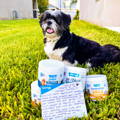Why Is My Dog Throwing Up Undigested Food?
Vet Verified
DEC. 2023 | WRITTEN BY DR. PATRICK MAHANEY
Jump to Section

Are your furry friend’s stomach issues leaving you puzzled and worried? Witnessing your beloved canine companion throwing up undigested food or regurgitating right after a meal can be scary––and messy.
We'll explore why your dog throws up after eating, point to possible causes, tell you when to worry, and teach you how to keep your pup's tummy in top-notch shape.
Why is my dog throwing up undigested food?
Have you ever found your furry friend unexpectedly decorating your carpet with undigested kibble? It's a sight that triggers concern and confusion among pet parents. Let's dive into the mystery of dogs throwing up undigested food.
Why does my dog throw up after eating, you ask? Well, the reasons can be as diverse as your pup's taste in treats. Sometimes, it's a harmless case of speedy eating, leading to indigestion. Other times, it might signify an underlying health issue, such as gastritis (stomach inflammation), food allergies, or other causes.
If your dog throws up after eating occasionally and seems otherwise healthy, it might just be a matter of pacing their meals. Consider investing in slow-feeder bowls to curb their culinary enthusiasm.
However, if your dog is persistently throwing up food, it's time to consult your veterinarian. Chronic vomiting could be a sign of more serious conditions that require professional attention.
Remember, our canine companions can't voice their discomfort. So, if the stomach upheaval persists, let's decode the symptoms and ensure our four-legged pals enjoy meals without the messy aftermath. After all, a happy pup is a healthy pup!
Vomiting vs. regurgitation
Navigating the world of canine digestive distress can be bewildering, especially when faced with terms like "dog throwing up undigested food" and "dog vomiting after eating." To unravel the mystery, understanding the nuances between vomiting and regurgitation is key.
Vomiting involves the forceful expulsion of stomach contents, often accompanied by abdominal contractions and telltale retching sounds from your dog. If your furry friend throws up food shortly after a meal, it's likely vomiting. This can be triggered by various issues, from dietary indiscretions to more serious health concerns.
On the other hand, regurgitation is characterized by an unexpected expulsion of undigested material from the esophagus. If your dog keeps throwing up food without the dramatic retching seen in vomiting, it might be regurgitation. This could signal problems with the esophagus or a too-quick gobbling of meals but usually isn’t cause for concern. A slow-feeding bowl might help if your dog is eating too quickly!
Understanding these distinctions empowers pet parents to discern between normal canine quirks and potential health issues, ensuring our furry companions live their happiest, healthiest lives.
How to tell the difference between a dog regurgitating food and throwing up after eating
Let’s summarize the difference between vomiting and regurgitation. When your furry companion vomits after eating, it involves a forceful expulsion of stomach contents often accompanied by retching and heaving. Keep an eye out for abdominal contractions and signs of distress like a tucked tail, flat ears, or a curved (hunched) back. Dogs who vomit may appear unwell before and after they vomit.
On the flip side, regurgitation is a more unexpected process, where undigested material is abruptly expelled from the esophagus seemingly out of nowhere. Dogs who regurgitate may go right about their business as soon as they spit up the undigested food as if nothing happened.
Observing these subtle differences empowers pet parents, ensuring prompt and accurate responses to their furry friend's digestive signals.

Why do dogs regurgitate food?
Ever observed your canine companion engaging in the quirky act of regurgitating their meals and wondered, "What's going on in that furry digestive system?" Let's delve into the intriguing reasons behind why dogs regurgitate food.
Firstly, regurgitation is distinct from vomiting and originates in the esophagus, that often-overlooked muscular tube connecting mouth to stomach. Unlike the stomach, the esophagus doesn't engage in digestion but acts as a conduit, propelling ingested substances downward through involuntary coordinated muscle contractions known as peristalsis.
Several factors can trigger regurgitation, with rapid eating topping the list. When a pup's enthusiasm outpaces the digestive process, it can result in the regurgitation of undigested material. Additionally, esophageal abnormalities or disorders may disrupt the smooth passage of food, causing it to resurface unexpectedly.
While occasional regurgitation might be benign, persistent incidents could signal underlying issues requiring veterinary attention. Understanding the intricacies of canine digestion empowers pet parents to ensure their furry friends savor meals without the peculiar spectacle of a dog throwing up undigested food.
Common reasons dogs throw up after eating food
If your dog is throwing up after eating–not regurgitation–there could be a few causes. An evaluation by your veterinarian can help identify the cause, but common reasons include:
Your dog is eating too quickly
Is your dog consuming meals too rapidly? This fast-paced approach to eating can result in digestive discomfort, increasing the risks of indigestion, throwing up food, and potentially choking, or even aspiration (inhaling food or liquid into the lungs). Keep in mind that a measured meal pace contributes to a happier, healthier dog.
Your dog is anxious or stressed
When you notice your pup throwing up undigested food, it could be a sign of underlying stress or anxiety. Dogs, like humans, can experience digestive upset due to emotional factors. Elevated cortisol levels, triggered by stress, may impact their gastrointestinal system, resulting in the regurgitation of undigested meals. Creating a calm environment can aid in soothing your canine companion's digestive woes.
Food sensitivity or intolerance
If your canine companion is constantly throwing up, it might signal a deeper issue like food sensitivity or intolerance. Their digestive system may struggle with certain ingredients, leading to throwing up or regurgitation. Identifying and eliminating potential triggers from their diet–and making sure to avoid foods dogs can't eat–can make a significant difference in their overall well-being
Digestion issues
If your furry friend is vomiting after eating, it could be a sign of underlying digestive issues. Factors like rapid eating or sensitivity to certain ingredients might be at play, causing gastric distress. Observing their behavior and consulting with a veterinarian can help pinpoint the root cause and establish a plan for a happier, healthier digestion.
Foreign object ingestion
If you find your canine companion throwing up undigested food after a meal, it could signal a more serious issue like foreign object ingestion. Dogs may unintentionally swallow items that irritate and obstruct their digestive tract, leading to vomiting. Seeking prompt veterinary attention is crucial to address potential blockages and ensure your pup's well-being.
The different types of vomit after eating & what they tell you
Not all vomit is created equal! The appearance, texture, and consistency of your dog’s vomit can tell you a lot about what’s causing the issue.
Whole pieces of food / chunky vomit
A dog vomiting after eating with undigested chunks could signal rapid ingestion, dietary sensitivities, or potential obstructions. If it happens regularly, consulting with a veterinarian can help unravel the clues in your pup's vomiting behavior.
Dark brown or black vomit
Color is an important part of analyzing your dog's digestive health, whether it be through their vomit or the color of their poop. If your canine companion is throwing up after eating and the vomit appears dark brown or black, it could be a concerning sign. This coloration may indicate the presence of blood, pointing to potential gastrointestinal bleeding. Another potential cause could be coprophagia (the consumption of feces) or other types of dietary indiscretion (eating something one should not), like soil, mulch, bark, sticks, etc.
Liquid yellow vomit or foam
When your dog is throwing up, and the vomit takes on a liquid yellow appearance or foamy consistency, it may indicate bile. This could stem from an empty stomach, or potential digestive issues with the gall bladder not emptying properly to secrete bile into the small intestine to facilitate digestion. While occasional occurrences might be benign, persistent symptoms warrant a veterinary visit.
Strong-smelling vomit
What does it mean when your canine companion's vomit packs a pungent punch? Strong-smelling vomit in dogs can result from various factors, including dietary indiscretion, gastrointestinal disturbances, or even infections (bacterial, viral, or parasitic). Paying attention to these olfactory clues can guide you in understanding and addressing your pup's well-being.
How to stop your dog from throwing up food
First, consider adjusting your dog’s feeding routine. Opt for smaller, more frequent meals to discourage rapid consumption, a common culprit in regurgitation. Introduce specialized slow-feed bowls to promote a measured pace.
Another strategy involves addressing dietary sensitivities. Assess your dog's current food for potential allergens, and gradually transition to a hypoallergenic or easily digestible diet. Hydration plays an important role, so make sure your companion has access to fresh water throughout the day to aid digestion.
Observing your dog’s mealtime manners can also help identify any causes of throwing up undigested food. Discourage scavenging or consuming non-food items, as this can lead to digestive distress.
If the issue of vomiting and regurgitation persists, consult your veterinarian. They can help you dig deeper into potential health concerns while ensuring your furry friend's stomach stays settled. Together, you can help make your pet’s meals a source of joy, not turmoil.
Join the Pack!

Sign up for exclusive deals, curated pet tips from veterinarians, and product launches!
Pet Parents are Also Reading
November, 2023
October, 2023
November, 2023
February, 2023
Written By a Vetnique Vet

Dr. Patrick Mahaney, VMD, CVA, CVJ
Dr. Patrick Mahaney works as a concierge-style veterinarian and has a number of celebrity clients through his house-call practice, California Pet Acupuncture and Wellness. He loves building personal, long-term relationships with his clients to best suit their pets’ needs within the comfortable confines of their homes.
To spread his message of holistic veterinary medicine on a large-scale basis, Dr. Mahaney attained a Certified Veterinary Journalist certificate and enjoys contributing to pet-related media projects. He is also a certified veterinary acupuncturist.
Sign up for exclusive deals, curated pet tips from veterinarians, and product launches!
























